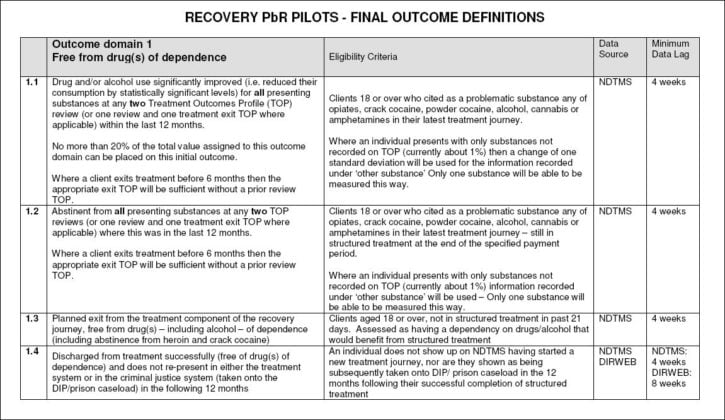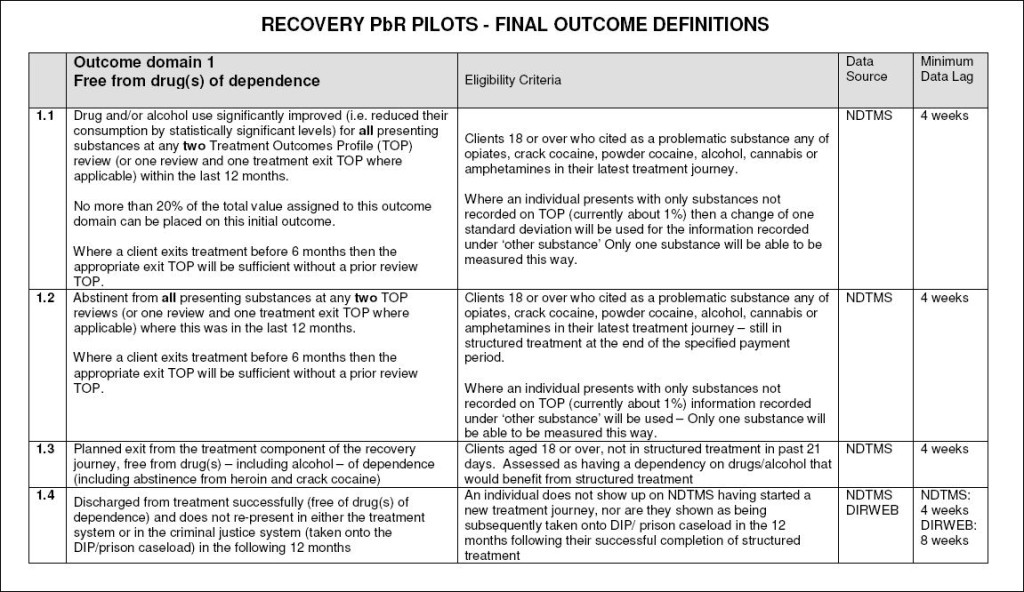Commissioning drug recovery using payment by results
I’m currently working on a project on how best to commission for drug recovery with the RSA which meant that I was lucky enough to be at a joint RSA/Drugscope meeting in May with all eight of the providers of the current drug and alcohol recovery PbR pilots.
The pilots have been operating for just over a year now and I thought it would be interesting to summarise my impressions from that meeting and explore how relevant they are to the proposed PbR model for the new reducing reoffending contracts.
The DoH has published the first performance data on the pilots which are pretty mixed although it is far too early to make any judgements on overall effectiveness.
What’s it like being a PbR pilot?
In a nutshell, pretty tough.
It seems that those delivering a PbR contract can find themselves under the media microscope and even presumed by the general public, other providers and indeed service users to have been given a licence to print money.
It was clear from the day that this is certainly not the case in the drug and alcohol field.
The providers all felt under huge pressure to perform both because their revenue (and therefore staff’s jobs) and organisational reputations were at stake. This had led to a very strong focus on recovery outcomes.
However, providers were also faced with a wide range of pressures.
Speed of implementation
Providers felt they had nowhere near enough time to develop the new systems needed to measure, record and validate outcomes and that the central government tools for this were not ready on time – something that seems likely in the re-offending arena, especially given the fact that the MoJ is going straight to a national roll-out with no pilots.
This situation was exacerbated for those providers who were taking over contracts from previous providers – who had, of course, to establish a new service as well as establish all the PbR mechanisms.
This will of course be the case for all MoJ contracts apart from those won by probation service mutuals.
Hasty implementation of PbR schemes inevitably causes difficulties.
Feeding the beast
Providers also said that they had had to invest heavily in skilled data analysts to be able to provide the information required by commissioners and that they had spent a disproportionate amount of time on collating, verifying, analysing and providing data which had taken some of the focus away from service delivery.
Triage
One of the most significant problems with the drug and alcohol recovery pilots is the fact that service users’ first contact with the treatment system is typically a comprehensive assessment, normally undertaken by a third party, whose sole purpose is to classify them on a complexity scale which determines the level of payment that successful outcomes will attract.
Although it is clearly right that payment is much greater for a long term, dependent poly drug user with mental health problems than for an occasional binge drinker, it means that the first contact is not with a helping service but a payment system.
The substance misuse field has spent much of the last 10-15 years striving to make access to services quick and easy and removing duplicate assessments and the vast majority of people see this double process necessitated by PbR as a serious backward step.
We will, of course, see a similar double assessment process in the new reoffending system when probation officers undertake a preliminary risk assessment for the primary purpose of determining whether an offender should be managed by themselves or a new provider (high risk cases stay with the probation service, medium and low risk go to the new providers).
Relationships with partners
As I’ve already mentioned, organisations operating PbR services can be met with suspicion. Some providers said that they had to work hard to gain the trust of partner organisations. For example, when declining to accept a referral on the grounds that the individual drug user was not currently interested in recovery, the decision was not seen as a clinical one, but financial: “You won’t take him because it will affect your outcomes/payments”.
There have certainly been some tense exchanges at recent MoJ Transforming Rehabilitation events between probation trusts and potential new providers about responsibility for sentence planning – probation officers may well be making recommendations which providers will have to deliver.
The fact that providers will still be eligible to receive outcome payments for offenders re-classified as high risk and transferred back to the supervision of the statutory probation service has also provoked raised eyebrows and voices.
Conclusion
Since we do not have PbR pilots in the justice arena, it seems important to be able to learn lessons from other fields such as drug and alcohol recovery.
However, it should be remembered that the justice PbR pilots have a big advantage because reconvictions can be easily and (pretty) reliably measured via the Police National Computer whilst the definition and measurement of recovery outcomes is much more complex and subjective (currently there are measures for abstinence, freedom from dependence/completion of treatment, stable housing, injecting behaviour and quality of life – as well as reconviction).
It will be interesting to follow the performance of the drug and alcohol recovery pilots as they become fully established and we discover whether the issues listed above are merely teething problems or embedded in a PbR-funded approach to recovery.









3 Responses
I like the helpful information you provide in your articles.
I’ll bookmark your blog and check again here frequently. I’m quite certain I will learn many new stuff right
here! Best of luck for the next!
We not only use a system for training addicts to cure themselves of their addiction, but for 47 years other recovery centres have been trained to do the same.
As a result, there are now at least 169 addiction recovery training centres (including prison units) in 49 countries where 55 to 70+% of addicts / students attain lasting abstinence first time through an 18 to 28 week residential programme.
In September in Central London, we are mounting a training seminar for UK providers titled “PAYMENT by RESULTS – How to Deliver 12 Months Free from Addictive Drugs Usage – WITHOUT RISKING INSOLVENCY”.
This is based on a totally different and decades proven set of principals from those being tested out by psychiatric Professor John Strang and his eight pilots, and, in light of his less than satisfactory results – as recently published – offers a successful alternative “PLAN B” programme which is capable of delivering all the requirements of the Coalition’s 2010 Drug Strategy.
You may contact me for details on 01342 810151.
Trust this helps.
Kenneth Eckersley,
CEO Addiction Recovery Training Services (ARTS),
a not-for-profit community support group formed in 1975.
As the debacle with serco and g4s prove it is difficult to imagine a scenario where private companies will not take the easy way out if they feel they can get away with it
Also as you point out the cost of monitoring and collating information probably outweigh any potential gain
I remain unconvinced about the whole ‘initiative’